How Much Does Link Building Cost in 2025? Complete Pricing Breakdown with examples
While you’re reading this very sentence, 47 new websites just launched. By the time you finish this paragraph, that number will hit 150. With 1.09 billion websites currently fighting for digital real estate, every click your competitors steal could be worth thousands in lost revenue.
Here’s what’s keeping successful businesses awake at night: They know that 91% of web pages get zero organic traffic from Google. Zero. Yet somehow, a small percentage of websites are capturing the lion’s share of clicks, leads, and sales. What’s their secret weapon?
It’s not just great content anymore. It’s not even perfect technical SEO. The companies dominating search results have mastered something most businesses completely overlook—and it’s costing the unprepared millions in missed opportunities.
We’re talking about strategic link building, and the numbers are staggering. A single high-quality backlink can increase your organic traffic by 15-20%. But here’s the mind-bending part: Most businesses are either completely ignoring link building or throwing money at outdated strategies that Google’s latest algorithms are actively penalizing.
The cost of link building in 2025 isn’t just about budget allocation—it’s about understanding which investments will 10x your visibility and which ones will tank your rankings overnight. The difference between strategic link building and amateur hour can literally make or break your online presence.
So what does effective link building actually cost in 2025, and more importantly, how do you avoid the expensive mistakes that are bankrupting your competition?
Let’s get right into general link building costs, and some FAQs that we often come across to help readers get a better grip on our link building services.
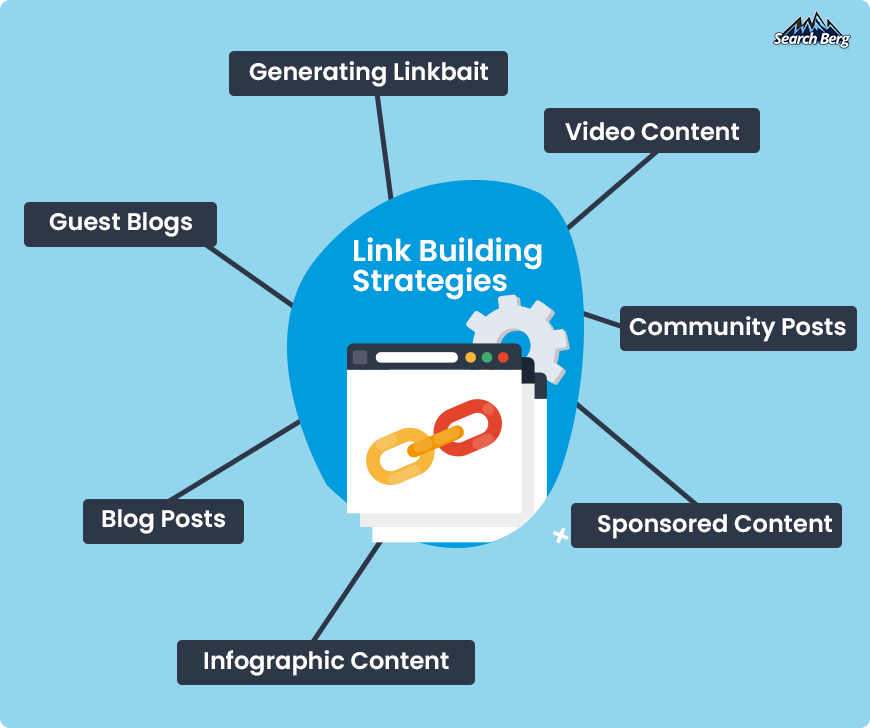
Time Investment: The Hidden Cost of Link Building
While many discuss the financial aspects, often overlooked is the most significant cost of link building: time. This invisible expenditure can significantly impact your overall SEO strategy and budget.
Research and Identification: A Time-Consuming Endeavor
The foundation of successful link building is thorough research. Identifying potential link opportunities requires substantial time commitment. You must deep dive into your industry, analyze competitors, and pinpoint authoritative websites relevant to your niche. This process involves:
- Keyword research:Identifying relevant keywords to guide your search.
- Competitor analysis:Studying competitor backlink profiles to discover potential partners.
- Outreach platform exploration:Familiarize yourself with tools to streamline the outreach process.
Each of these steps demands hours, if not days, depending on the complexity of your niche and the scale of your campaign. It’s nearly impossible to handle this aspect of SEO without professional link building services to back you up.
Content Creation: A Central Facet of Link Building
High-quality content is the heart and soul of effective link building. Creating content that is informative, engaging, and shareable takes time and expertise. This involves:
- Topic ideation: Brainstorming content ideas that align with your target audience and link building goals.
- Content creation:Writing, designing, and formatting content to meet high standards.
- Content optimization:Ensuring content is SEO-friendly to improve visibility and attract backlinks.
Developing exceptional content is an iterative process that requires multiple drafts, revisions, and feedback, and an in-depth understanding of SEO and link building.
Maintenance and Monitoring: An Ongoing Commitment
Link building isn’t a one-time effort. Maintaining and monitoring your link profile is crucial for long-term success. This involves:
- Link profile analysis:Regularly check your backlink profile for toxic links or opportunities. Our link building prices include audits that identify black hat links and harmful links.
- Link reclamation:Recovering lost or broken links.
- Link acquisition:Continuously seeking new link opportunities.
Staying on top of these tasks demands consistent attention and resources.
The time invested in link building is a substantial cost often underestimated. While it may not have a direct monetary value, the opportunity cost can be significant. Balancing the time required for research, content creation, and maintenance with other SEO activities is crucial for maximizing your ROI.
Many businesses consider backlink building services, focusing on the benefits and long-term impact on your SEO strategy rather than short-term expenses.
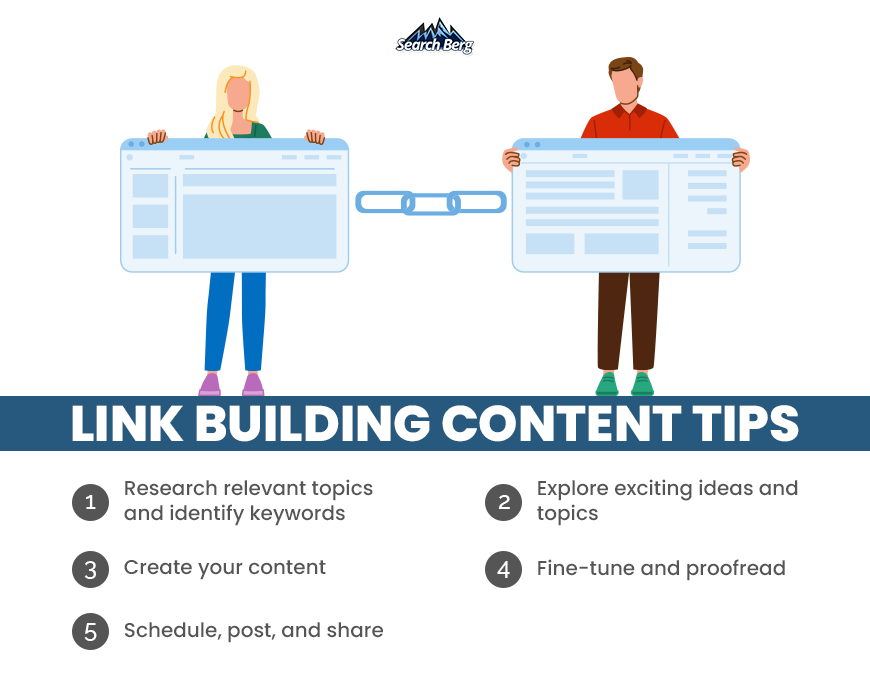
Recommended Read: How to Create a Link Building Campaign: A Beginner’s Guide
Resource Allocation: Balancing Costs and Benefits
While the time investment in link building is substantial, so are the financial implications. Understanding these costs of link building is essential for making informed decisions about your strategy.
Financial Outlay: Tools, Software, and Outsourcing
- Link building tools and software: Investing in specialized tools can streamline the process, but these come at a cost. From link analysis and outreach platforms to content creation and SEO software, the expenses can quickly add up.
- Outsourcing link building activities: Hiring an agency or freelancers to handle link building can significantly reduce the time spent on this task but introduces additional costs. These include fees for the agency and additional services that you require.
While these financial investments may seem daunting, it’s crucial to consider the potential return on investment (ROI). A well-executed link building campaign can lead to increased organic traffic, higher search engine rankings, and ultimately, more revenue.
Opportunity Cost: Prioritizing Your Resources
Another critical factor to consider is the opportunity cost of dedicating resources to link building. Every dollar and hour spent on link building is a dollar an hour less available for other marketing activities. This could include content marketing, social media, paid advertising, or email marketing.
This is where hiring link building services can be advantageous. By outsourcing this task, you free up valuable resources to focus on other areas of your marketing strategy. This allows you to diversify your efforts, potentially reaching a wider audience and driving more conversions.
Link building services offer several benefits:
- Expertise: Link building agencies have experienced professionals who understand the nuances of the industry and can execute effective campaigns.
- Efficiency: They can often achieve results faster than in-house teams due to their specialized knowledge and resources.
- Scalability: Link building services can easily scale their efforts to meet your business needs.
- Risk mitigation: Reputable agencies are aware of link building best practices and can help you avoid penalties.
By choosing a seasoned SEO and backlink building service such as ours, you get to enjoy flexible rates and link building packages, including our Link Foundations package which is only $299/month, The Link Starter Package which is $399/month, The Link Enthusiast Package which is $799/month or The Serial Linker package which is only $1899 a month.
Each package offers specific services ranging from directory submissions to social links to routine audits and more, allowing you to choose the package that best meets your needs and your budget.
By carefully evaluating the financial costs, time investment, and opportunity costs associated with link building, businesses can make informed decisions about whether to build an in-house team or outsource link building services. The ultimate goal is to optimize resource allocation for maximum ROI and achieve sustainable growth.
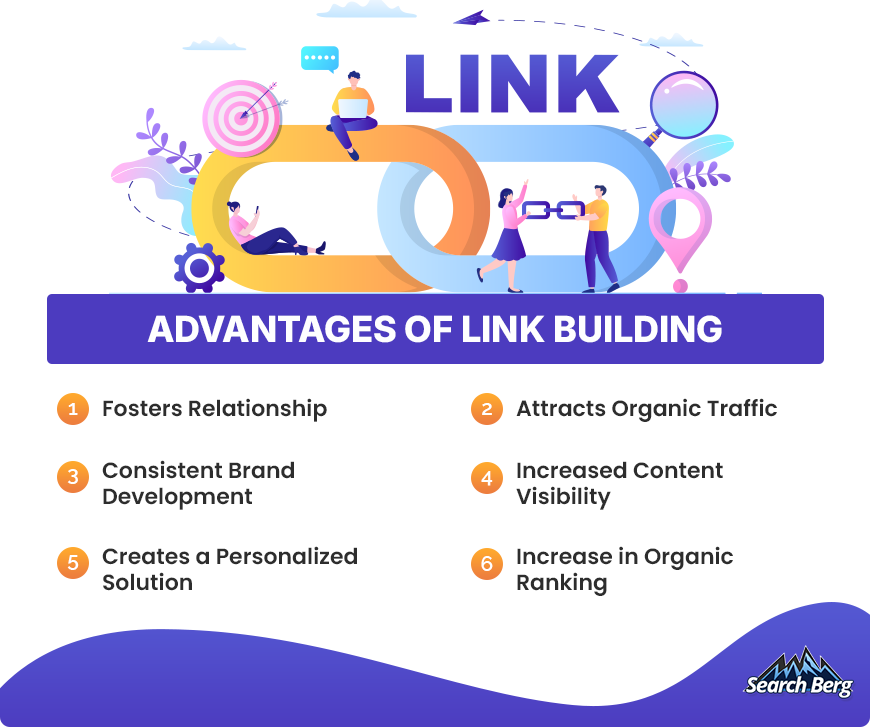
Recommended Read: Link Building Trends to Watch Out for in 2023
How Does Link Building Actually Work?
At its core, link building is the process of getting other reputable websites to link back to your own, often through a mix of strategy, research, content creation, and outreach. It’s not just about dropping links randomly across the internet. It’s about building genuine connections with credible sites that are relevant to your niche and have real authority in the eyes of search engines.
The Link Building Process
The process typically starts with identifying link opportunities, creating content that’s worth linking to, and then reaching out to website owners, editors, or journalists to earn those links through value, not spam. Done right, it strengthens your domain authority, improves keyword rankings, and drives long-term organic growth.
Link building is a strategic marketing effort that connects your brand with relevant, trustworthy websites across the internet. But here’s what most people get wrong: it’s not about collecting links, it’s about earning the right ones.
The process starts with identifying which websites are worth reaching out to. You’re not just looking for anyone who’ll give you a link, you’re looking for publishers and domains that actually hold weight in your niche.
What Makes a Quality Backlink Worth $100+?
Before we dive into spotting bad deals, let’s establish what you’re actually paying for when you invest in legitimate link building.
Not all backlinks are created equal. A quality backlink typically comes from:
- High-authority websites with Domain Authority scores of 50+ that have earned their credibility over years
- Sites with genuine organic traffic– real visitors, not just inflated metrics
- Relevant, well-maintained content that actually serves an audience in your industry
- Engaged communities where your link will be seen by people who might actually click through
When you’re paying $100-500+ for a single backlink, you’re not just buying a link – you’re investing in websites that have spent years building their authority, audience, and reputation. These sites are selective about who they link to because their credibility is on the line. They have editorial standards, real readership, and the kind of domain strength that can genuinely impact your search rankings.
The cost reflects scarcity: there are only so many high-quality, relevant websites in any given niche, and they don’t hand out links to just anyone.
What Does an Authentic Backlink Cost?
It depends on the industry, the publisher, and the audience size. A single high-quality link might cost you $200 or more, depending on the niche. If you’re in a highly competitive space like finance or crypto, the price per link can soar even higher, sometimes upwards of $500 to $1,000.
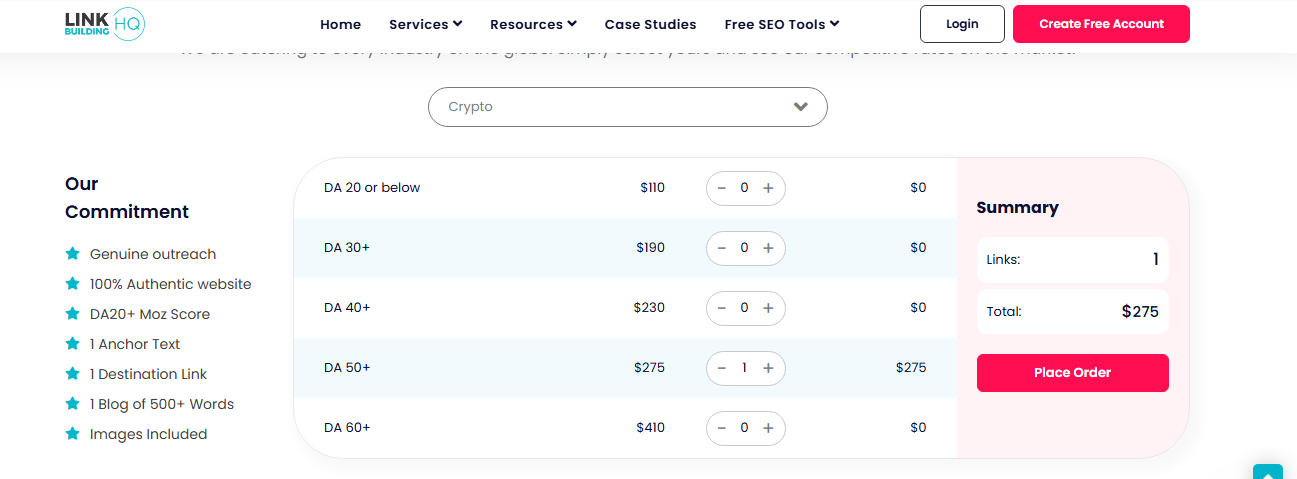
On the other hand, links in lower-competition niches like pet care or home improvement may come at more affordable rates.
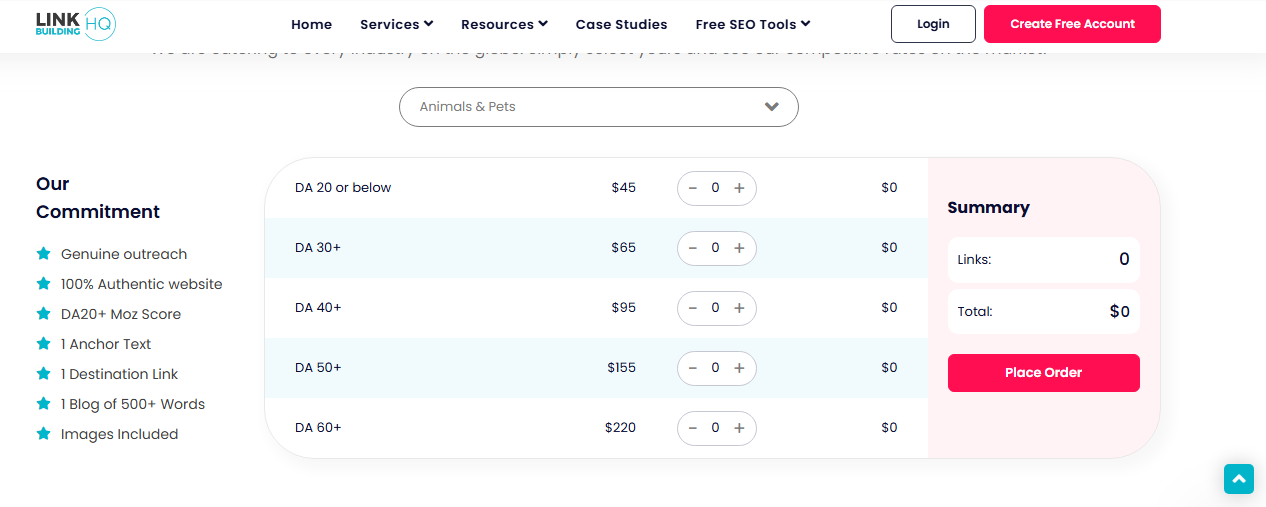
Every site charges differently. Some media sites charge based on their Domain Authority or traffic benchmarks. Others base it on placement type, link longevity, or whether it’s a dofollow or nofollow link. There’s no fixed rate card in this space, just market value based on trust, exposure, and quality.
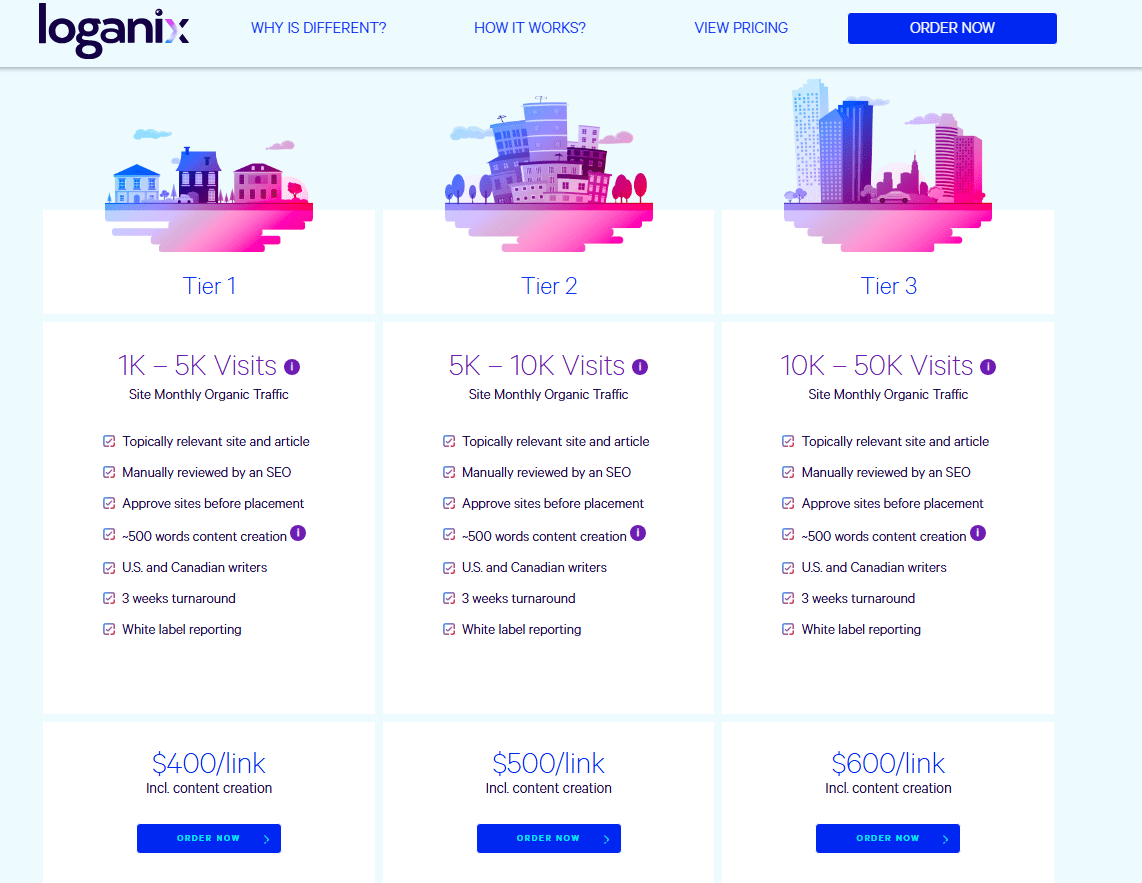
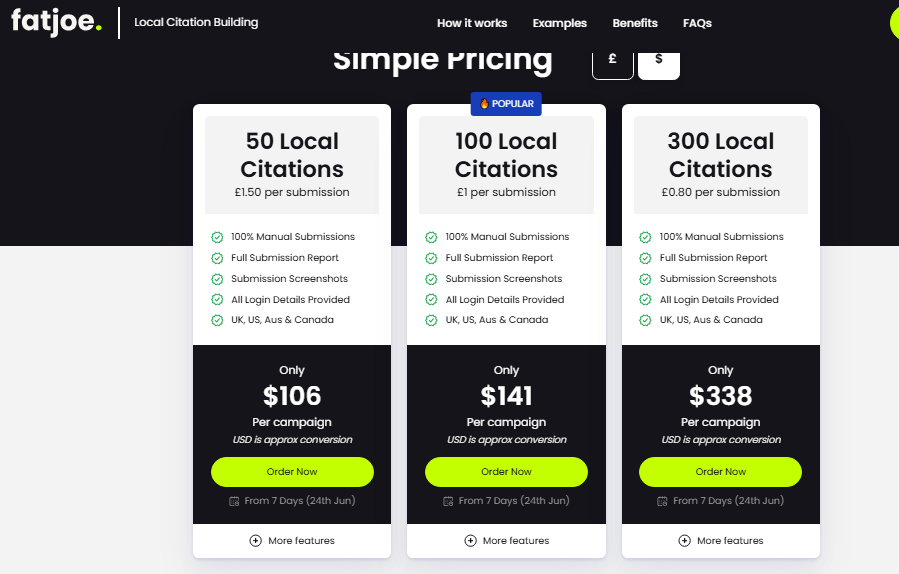
This example also highlights how, unlike many sites that let you blindly choose the number of backlinks you want, reputable platforms are transparent, they show exactly what you’ll get, how many links, and at what price. There’s no universal rate card here. Every website has its own pricing model based on authority, traffic, niche, and placement value.
This is why businesses that are serious about SEO either build their own in-house teams to manage the process carefully or they partner with trusted SEO agencies that already have the experience, relationships, and tools to deliver clean, white-hat links that actually move the needle.
So now that we know how link building works and what makes a link genuinely valuable, let’s talk numbers.
The Link Building Trap: Too Good to Be True
Now here’s where many businesses fall into the trap.
In their eagerness to “build links fast,” they stumble upon offers that sound too good to be true, because they are. You’ll see ads or sellers claiming they’ll give you 50 backlinks for $100. Tempting, right? But let’s be clear: this is not valid link building. Lets analyse this image for example:
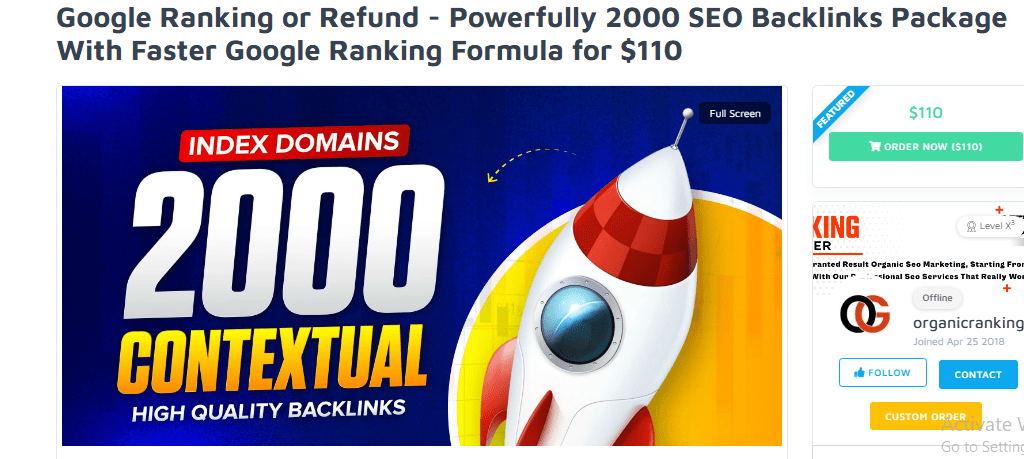
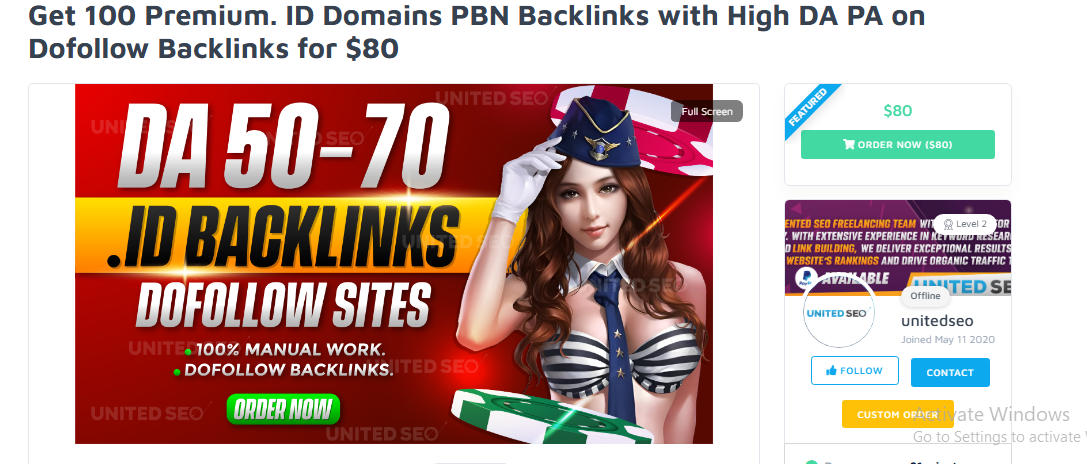
It’s a fair question: if a single quality backlink in a competitive niche often costs well over $100, why are some websites offering dozens for just a fraction of that? What’s really going on behind those too-good-to-be-true deals?
These are often links from low-quality directories, private blog networks (PBNs), or spammy websites that exist solely to manipulate rankings. Google sees through this. Not only do these links fail to help your SEO, they can actually hurt your rankings if detected as part of a manipulative link scheme.

Source: https://support.google.com/websearch/answer/10622781#zippy=%2Cspam
Instead, real link building is slow, deliberate, and value-driven. It happens through outreach, content, and collaboration with credible websites that have actual authority and audiences. These are the kinds of sites that don’t hand out links like candy and when they do, there’s a price attached that reflects their worth.
The Real Cost of Link Building , Comparing In-House vs. Outsourced Link Building
There are two main routes to building high-quality backlinks: assembling your own internal SEO team or partnering with an agency that specializes in link acquisition. Both come with unique costs and strategic implications.
Let’s break down the real cost of each approach.
In-House Link Building: The Breakdown
Building a fully functional in-house link building team is a long-term investment. Here’s what you’ll likely need to get started:
1. Outreach Specialist
Monthly Salary: $3,000 – $5,000
Why it matters: This person handles prospecting, building relationships, and pitching content to relevant sites. The outreach specialist serves as the front line of your link building campaign, directly influencing your success rates through their ability to identify high-quality prospects and craft compelling pitches that resonate with publishers. Their relationship-building skills determine whether you’ll secure one-time placements or develop long-term partnerships that provide ongoing opportunities. A skilled outreach specialist can transform cold prospects into warm connections, dramatically increasing your acceptance rates while reducing the time and effort required per successful placement.
2. SEO Strategist
Monthly Salary: $4,000 – $6,500
Why it matters: Responsible for defining which pages need links, determining anchor text strategies, and overseeing campaign goals. The SEO strategist acts as the architect of your entire link building operation, ensuring every effort contributes meaningfully to your search rankings and organic traffic growth. They analyze your current link profile, identify gaps and opportunities, and create targeted campaigns that address specific weaknesses or capitalize on competitive advantages. Their strategic oversight prevents wasted resources on low-impact activities while maximizing the SEO value of each acquired link through proper anchor text distribution and link placement strategies.
3. Content Writer or Copywriter
Monthly Salary: $2,500 – $4,000
Why it matters: Creates high-quality guest posts, linkable assets, and landing pages. The content writer transforms your link building strategy into compelling, publishable material that editors and publishers actually want to feature on their sites. Their ability to create valuable, engaging content directly impacts your campaign’s success rate, as publishers are far more likely to accept and promote content that provides genuine value to their audience. Quality content also generates natural social shares and additional backlinks beyond the initial placement, multiplying the return on your investment while establishing your brand as a thought leader in your industry.
4. Project Manager / Team Lead
Monthly Salary: $3,500 – $6,000
Why it matters: Ensures everyone stays on task, deadlines are hit, and deliverables align with your SEO goals. The project manager serves as the central nervous system of your link building operation, coordinating between team members and maintaining the momentum necessary for successful campaigns. They track performance metrics, identify bottlenecks before they become problems, and ensure consistent quality across all deliverables. Their oversight prevents campaigns from losing focus or falling behind schedule, while their data analysis helps optimize processes and improve results over time, ultimately determining whether your link building investment generates positive ROI.
5. SEO Tools & Software
Ahrefs, BuzzStream, Pitchbox, SEMrush, Surfer SEO, etc.
Monthly Cost: $500 – $1,500+
Total Monthly Cost for In-House Setup:
$13,500 – $23,000+ per month depending on experience level and campaign complexity
Average Cost per Link (in-house):
$600 – $800, with high-quality passive content possibly lowering it to $300 – $400.
Outsourced Link Building (Agencies)
Working with a link building agency means you pay for results, strategic planning, outreach, link placements, and content, all handled externally. Here’s how it breaks down:
1. Major Content Marketing Agencies
These agencies offer full-service link campaigns, often bundled with digital PR and content strategy.
Pricing: $15,000 – $30,000 per campaign
Average cost per link: $400 – $1,500
Use case: Enterprise clients, competitive niches, end-to-end SEO strategy
2. Specialist Link Building Agencies
Focused solely on acquiring backlinks with targeted outreach.
Monthly Retainer: $3,000 – $15,000+
Cost per link: $150 – $750 (depending on quality, niche, and volume)
Use case: Businesses looking for scale and efficiency
3. Premium Digital PR Agencies
Experts at landing links from major media (Forbes, Business Insider, etc.)
Cost per link: $1,250 – $2,500+
Use case: High-authority brand mentions in competitive verticals like finance or crypto
Total Monthly Cost with an Agency:
$3,000 – $30,000+ depending on link quality, volume, and campaign scope
Average Cost per Link (agency):
$250 – $2,000+ depending on strategy and placement tier
Choose Your Link Building Path: Inhouse link building vs Agency link building
| Inhouse Link Building |  |
Agency Link Building |
|---|---|---|
| Feature | In-House Team | Link Building Agency |
| Setup Time | 1–3 months (hiring & onboarding) | Instant – ready to go |
| Control Over Brand Voice | High | Medium |
| Scalability | Slower | Fast |
| Link Quality Risk | Low | Varies – agency dependent |
| Expertise & Tools | You’ll need to buy tools + hire specialists | Comes bundled with tools, outreach software, and expertise |
| Content Creation | Internal content writers with no specialized niche content | Expert writers specializing in niche-specific content |
| Time Investment | High | Low |
| Best For | In-House: Enterprises with SEO maturity & internal bandwidth | Agency: SMBs, startups, or anyone needing results without building team |
 |
||
The Long-Term Perspective: Building for the Future
While the immediate costs and efforts associated with link building can be significant, it’s crucial to view this strategy as a long-term investment. When executed correctly, link building can yield substantial returns that extend far beyond initial expenditures.
ROI: A Long-Term Play
The ROI of link building prices is often not immediately apparent. Building a strong backlink profile takes time and consistent effort. However, the rewards can be substantial. Higher search engine rankings increased organic traffic, and enhanced brand authority can lead to increased conversions, sales, and customer acquisition. While calculating the exact ROI can be complex, the long-term benefits often outweigh the initial costs.
Sustainable Link Building: A Strategic Approach
To achieve sustained success with link building, it’s essential to adopt a strategic and long-term perspective. A sustainable link building strategy focuses on building relationships, creating valuable content, and earning natural links over time. Rather than relying on quick fixes or black-hat tactics, this approach prioritizes quality and longevity.
Key components of a sustainable link building strategy include:
- Content creation: Producing high-quality, informative, and shareable content that attracts natural backlinks.
- Relationship building: Cultivating relationships with influencers, journalists, and other industry professionals.
- Outreach: Proactively promoting your content and seeking link opportunities.
- Link monitoring: Regularly tracking your backlink profile and taking action to address any issues.
Balancing Link Building with Other SEO Factors
While link building is a crucial component of SEO, it’s essential to remember that it’s just one piece of the puzzle. A holistic SEO strategy involves optimizing various on-page and off-page factors.

To maximize your SEO efforts, consider the following:
- On-page optimization:Ensuring your website is well-structured, fast-loading, and optimized for relevant keywords.
- Technical SEO:Addressing technical issues that can impact search engine visibility.
- User experience:Providing a positive user experience through intuitive navigation, mobile-friendliness, and valuable content.
- Local SEO:Optimizing your website for local search if applicable.
By combining effective link building with a comprehensive SEO strategy, you can achieve long-term success and build a strong online presence.
With these aspects discussed, let’s get into some FAQs and lesser-known aspects of the cost and process of link building:
Critical Link Building Challenges Small Business Owners Struggle With
Problem: You’re not seeing any return on investment from your link building efforts
Your website’s search engine ranking depends heavily on quality backlinks that act as “votes of confidence.” When search engines see authoritative sites linking to yours, they recognize your content as valuable and trustworthy. Without this foundation, you’re missing out on higher search rankings, increased organic traffic, and the brand visibility that drives real business growth.
Problem: You’re confused about how to acquire links without buying them
Many small business owners fall into the trap of purchasing links, not realizing this creates more problems than solutions. The sustainable approach involves earning backlinks through creating genuinely valuable content, building authentic relationships with industry leaders and relevant platforms, and conducting strategic outreach. This organic method takes longer but builds lasting authority that search engines reward.
Problem: You’re worried about getting penalized by search engines
The biggest threat to your online presence comes from black-hat link building tactics like buying links or participating in link schemes. These shortcuts can result in devastating penalties including plummeting rankings or complete removal from search results. Additionally, poorly planned campaigns drain your time and resources without delivering results, leaving you frustrated and behind competitors.
Problem: You can’t tell the difference between good and bad backlinks
Quality backlinks come from reputable, industry-relevant websites that genuinely find value in your content. These links are earned through creating resources worth sharing, building real relationships, and providing authentic value to other site owners. Focus on developing a diverse, natural link profile rather than chasing any link you can get.
Problem: You don’t understand how backlinks translate to business revenue
While backlinks don’t directly generate sales, they’re the foundation that makes everything else possible. Quality backlinks drive more qualified traffic to your site, improve your search rankings for terms your customers actually use, and increase brand recognition in your market. This compound effect ultimately leads to more leads, sales, and revenue, but only when backlinks are part of a comprehensive SEO strategy.
Problem: You keep making the same link building mistakes that waste time and money
The most damaging errors include:
- Focusing solely on quantity over quality– Chasing hundreds of low-value links instead of pursuing fewer, high-authority backlinks that actually move the needle.
- Purchasing links from questionable sources– Buying cheap link packages that often come from spammy or irrelevant websites, putting your entire domain at risk.
- Neglecting link maintenance– Failing to monitor your existing links for broken pages, removed links, or sites that have become low-quality over time.
- Ignoring link diversity– Building an unnatural link profile that raises red flags with search engines by having too many links from the same types of sources.
- Using irrelevant anchor text or over-optimizing anchor text ratios– Either stuffing target keywords into every anchor text (which looks unnatural) or accepting links with completely irrelevant anchor text that provides no SEO value.
- Ignoring local link building opportunities in favor of high-authority but irrelevant sites– Chasing links from major publications that have nothing to do with your local market while overlooking valuable opportunities like chamber of commerce listings, local business directories, and community partnerships.
These mistakes not only waste your investment but can actively harm your rankings. Consider partnering with professional link building services who understand these pitfalls and can execute a strategy that actually delivers results.
Recommended Read: 4 Common Link Building Challenges for Small Business Owners
Building a Strategic Link Building Foundation
Effective link building requires a comprehensive approach that combines technical expertise with strategic planning. The most successful campaigns focus on creating sustainable link acquisition strategies that align with both search engine guidelines and business objectives.
Professional link building typically involves analyzing your current link profile, identifying high-value opportunities, and developing relationships with relevant websites in your industry. This process requires ongoing optimization of both your own content and outreach efforts to secure quality backlinks that drive meaningful results.
Modern link building strategies focus on creating both outgoing and incoming links that provide genuine value. Outgoing links help establish your site’s credibility by connecting to authoritative sources, while incoming links from reputable sites signal to search engines that your content is trustworthy and relevant.
With Google’s algorithms becoming increasingly sophisticated at detecting artificial link patterns, the businesses thriving in 2025 are those that treat link building as relationship building rather than transaction processing.
The question isn’t whether you need a link building strategy – it’s whether you’re prepared to invest in the long-term approach that separates sustainable growth from short-term gains. As we move forward, understanding how to evaluate link opportunities and measure their true impact becomes the difference between budget allocation and strategic investment.
Build Links and Build Connections
Work with our team on comprehensive link building services for competitive prices.
No spam, just expert advice!












